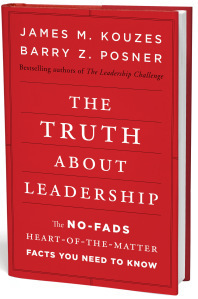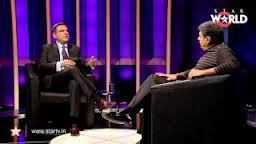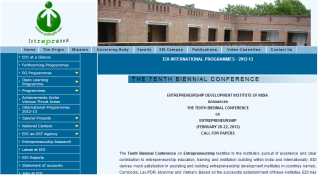Raj Shankar's Blog, page 58
February 23, 2013
Interesting Links This Week: 24-Feb-2013
The three links that have made it to my this week’s list:
a) We hear so much about The Silicon Valley - What would it take to create it here? Interesting thoughts around this theme got me thinking on the outlook change we require in our technopreneurs and the ecosystem maturity that is demanded for making this happen: http://therodinhoods.com/forum/topics/can-we-create-a-silicon-valley-in-india
b) An interesting article as we near our budget pronouncement http://articles.economictimes.indiatimes.com/2013-01-18/news/36416450_1_tax-rates-higher-tax-abheek-barua
c) Though this could come couple of months late, they still present a worthy read. I have managed to read most of them earlier – but the list could come in hand for many of us seeking additional reading material around varied topics http://blogs.hbr.org/hbr/hbreditors/2012/12/33_hbr_blog_posts_you_should_r.html


February 22, 2013
Books and Me: The Truth About Leadership
Title: The Truth About Leadership
Authors: James M. Kousez & Barry Z. Posner
Kousez and Posner are leading thinkers on the subject of leadership. If you are even remotely interested in the subject it is very unlikely that you have not yet read a book of theirs. The duo have produced many classics on leadership over the past decades.
In today’s turbulent world, even established organizations, are being tested for their stability and sustainability. Small emerging enterprises are facing enormous challenges with respect to managing people. The overarching trend towards knowledge and information is also increasing the need for leading over managing. Leadership as a subject is probably the most written about in business and management. Right from identifying traits, behaviours and approaches, to suggesting systems and techniques – this body of literature seems swelling by the day. This trend only indicates the acute demand for thoughts on this subject. The authors themselves have some of the highest selling books to their credit in the genre.
This little book that can probably be completed in just a couple of hours has the essence of the subject that has lasted probably a generation. The authors have taken effort in identifying those aspects of leadership that have remained unchanged through the history of the subject. While at the first glance the ten truths listed by the authors seem obvious, it is only when we immerse in their detailing that we get to understand their deeper connotations. The book is not a quick fix to any leadership problems, but a reassurance on the importance of leading and the responsibility that leaders must take on for the sake of the larger good.


February 21, 2013
On Entrepreneurship: Tips from a serial entrepreneur
Not one to watch too much of TV – surprisingly whenever I sit in front of it I run into some real gems. 
Last Saturday a casual channel surf got me to Star World where I saw actor Boman Irani as the interviewer. Obviously this got me interested as I thought he would be the other party in a typical interview – getting interviewed. It turns out that the feature was on achiever’s club – awards for excellence in various fields. And that day they were interviewing Ronnie Screwvala. The program had already started but I got riveted due to some statements made by Ronnie Screwvala. Obviously out came my notebook and I noted some points that stuck me hard. Though I am sure there were many take-aways, these were the one’s that connected with me at the level of an entrepreneur and strategist.
There is a thin line between being before time and being a pioneer
However big you are – you need to have an eye on cost
It is very easy to get first level funding – but to sustain till the next is the issue. You cannot run out of cash while running
There were 100 moments in the first 5 years when I wanted to go back.
Art of convincing is not about winning an argument. It is about being tenacious enough to last till the end.
I don’t understand the compulsion to unwind. You have to unwind only if you are wound up.
Advice for young India: Stop Talking About Potential: Act!
Be Consistent!
Please note these are not verbatim statements – but are faithful to the speed at which my hands could write what my ears were capturing. As I was sitting down to share these with you, I found a link on youtube where the interview is up. You may want to listen to the man himself speak: http://www.youtube.com/watch?v=NTVKUMW6Vlo
On playing with these statements in my mind the last few days – I believe many of these are something that entrepreneurs and business owners will connect to and appreciate. But they are also equally true for anyone who wants to do something useful in their lifetime. Will I see this Saturday interview? – I am not sure. But If I do – be sure I will share my learning with you!


February 20, 2013
On Innovation: Creativity Requires Courage
Creativity is an important aspect of Innovation. Many of the scientific discoveries sit on a creative thought – A thought that  stopped asking Why? And started asking why not? Right from moving from geo-centric to helio-centric planetary system, to structure of benzene, to buoyancy and scores of other life changing discoveries and invention, the question ‘Why Not’ has paved the way.
stopped asking Why? And started asking why not? Right from moving from geo-centric to helio-centric planetary system, to structure of benzene, to buoyancy and scores of other life changing discoveries and invention, the question ‘Why Not’ has paved the way.
Courage to come up with ideas that seem outright crazy is but an essential aspect of creativity.
If people in the past had not made attempts to think of these out of the world ideas, we may not have seen many of the developments that we see today. We certainly may not remember too many of them, but their contributions remain fueling many of the modern day contraptions. These selfless people with open minds that had the capacity to dream big, are the ones who have led society forward. We need more of them. But the truth is all cannot be them. However we can all play a definitive part, in the collective journey of innovation. Then the first step that we need to do is to stop asking ‘WHY’ when someone suggests a solution, and start saying ‘WHY NOT!’ Even this requires tremendous courage. Many a times even more than the ideaist! Do you have it?


February 19, 2013
Vedantic Wednesday: The Sun and The Soul
In a satsang last week – a question was asked. And as the question came from the realm of the world – it seemed very  practical, till the time the speaker gave the answer. The question was: ‘You say our Soul enlivens the body. Without Soul body cannot act. So all the acts of the body should be logically attributed to the soul. So soul should be responsible for the acts of the body – and in that manner get impacted. But you say at all times our Atman/Soul/SELF is complete and unblemished’
practical, till the time the speaker gave the answer. The question was: ‘You say our Soul enlivens the body. Without Soul body cannot act. So all the acts of the body should be logically attributed to the soul. So soul should be responsible for the acts of the body – and in that manner get impacted. But you say at all times our Atman/Soul/SELF is complete and unblemished’
Not only was the person asking the question clear on his doubts, the way his doubts was phrased made us all start our own branches of questioning on these lines. Many of us felt we had the speaker foxed with a tough question. Some had a small smile as they were mulling at the possible discomfort this question has created for the expert. And as always the master was also smiling. The answer that was given is what I am sharing below:
‘The body is made of inert elements. By itself our body is like any other mineral or matter. The closeness to the Atman is what enables the body to acquire sentiency and dynamism. However we cannot hold Atman responsible for the activities of the body. Also, though it is said that the Atman bestows consciousness and life, it cannot be treated as an activity of the Self.
This can be understood by a simple analogy. By the virtue of being close to the sun, earth receives warmth. The warmth and light trigger a lot of action on earth. Sun bestows life on earth by its presence. But can we say this is Sun’s duty? Can we hold the Sun for subsequent actions that happen on earth? Similarly the Atman enlivens the inert conditionings by its very presence. But it is external to all that happens in, of and through the body’
This conversation gave me some points to think around understanding better the difference and distinction between the transient body and timeless soul.
However it also taught me a far more valuable lesson – one that I am sure will help me in my further studies. As logical sceptics, we may have many queries. Our ego could lead us to believe that the query itself is an intellectual first of its kind. But let us not forget that sceptics and intellectuals have been around since the birth of Vedas. The deep wisdom born out of clear understanding was able to answer them then – answers us now and are sure to continue answering any questions that we pose in the future. While asking questions is key to learning – it gets completed only if we are willing to listen and contemplate on the answers. This is true for any study that we undertake – be it on science or be it Vedanta!


Abstract of the paper to be presented at the tenth biennial conference, EDI India
The Entrepreneurship Development Institute of India (EDI), an autonomous body and not-for-profit institution, set up in  1983, is sponsored by apex financial institutions, namely the IDBI Bank Ltd, IFCI Ltd. ICICI Ltd and State Bank of India (SBI). It is supported by Gujarat Government. An acknowledged national resource institution, EDI is committed to entrepreneurship education, training and research. The institute strives to provide innovative training techniques, competent faculty support, consultancy and quality teaching & training material. It is considered as the Apex body for promotion of entrepreneurship.
1983, is sponsored by apex financial institutions, namely the IDBI Bank Ltd, IFCI Ltd. ICICI Ltd and State Bank of India (SBI). It is supported by Gujarat Government. An acknowledged national resource institution, EDI is committed to entrepreneurship education, training and research. The institute strives to provide innovative training techniques, competent faculty support, consultancy and quality teaching & training material. It is considered as the Apex body for promotion of entrepreneurship.
The tenth biennial conference on entrepreneurship is to being held between Feb 20th – Feb 22nd, 2013 at EDI India, Ahmadabad. It is an established forum for researchers, educators and practitioners to share their ideas and research results with other researchers and thinkers in the field, interchange feedback and sharpen their own ideas.
True to this intent the schedule for the conference indicates large possibility of idea exchange and interaction. I am here at EDI Ahmadabad, for presenting a paper titled ‘Idea to Opportunity Maps (I2O Maps): An Alternative Starting Point in Venture Creation’ at the conference.
The paper has been based on the pressing need to bring more predictability into enterprise creation, make possible intelligent investment of already sparse resources and also the need to preserve and encourage entrepreneurial spirit. I am sharing the abstract of the paper that I am going to be presenting
____________________________________________________________________________
Abstract
Venture creation is typically marked with the spotting of a lucrative opportunity in the market or the appearance of a creative idea in the intellectual domain of the entrepreneur. Increasing democratization of information, relaxation of venture set-up hurdles and improving socio-economic conditions have catalysed both opportunity sighting and ideation. This has resulted in an enhanced rate of start-ups, which prima-facie appears to be a healthy and welcome trend. However, this has not changed the early mortality rate of start-ups. The strength that a venture then derives at the point of start when it is based on an independent idea or an opportunity is examined. A possible alternate start point through Idea to Opportunity mapping (I2O Maps) that combine the strength of these two independent key components is presented. A tool that leverages imperatives from the social and creative domain to validate and select the best possible I2O Maps is elaborated. The benefits of the tool and the framework are detailed. The framework and the tool should open up possibilities for further research in validating the influencers for venture creation at the pre-start phase.
_____________________________________________________________________________
The morning thought on strategy came as I was waiting to travel for this conference. Considering the start of the day, I am sufficiently charged up. I am looking forward to three days of exciting thought share and more days of useful pondering. Will share the thoughts as they arise with all of you!


February 18, 2013
On Strategy: For what do you strategize?
I love to reach airport early. It helps me approach my travel without the last minute rush. More importantly it allows me to spend lot more time at the airport book store. Airport book stores are rather special because for some reason the new arrivals seem to hit the stands here before the city retail outlets. So here I was this morning at the Chennai airport, on my way to Ahmadabad to attend a conference. And I made my way to the bookstore with enough time to spare.
at the airport book store. Airport book stores are rather special because for some reason the new arrivals seem to hit the stands here before the city retail outlets. So here I was this morning at the Chennai airport, on my way to Ahmadabad to attend a conference. And I made my way to the bookstore with enough time to spare.
Many books caught my attention, but I kept coming back to this book , ‘Playing to Win’ by A.G. Lafley, and Roger L. Martin. The book is released by Harvard Business Review Press, and I found the blurb on the book very interesting. Obviously, this book has got on to my ‘must read’ list. You should soon be seeing a review on this in the blog’s Books and Me section. However this post is not about the book. It is about the thought that came to me sometime later, as I waited for my boarding announcement.
As a professor who teaches strategy, I find myself spending a lot of time discussing and thinking around what strategy ought to mean to a firm.A key question that came to my mind today was ’For what should you strategize – for winning or for playing?’ Being a person with a philosophical bent I feel it should be the latter. Beyond the play of words – the choice between ‘Winning’ or ‘Playing’ changes the rules, the outlook, the prize, the field, the motivation and the spirit of the game. I know this thought is not going to leave the labyrinth of my mind any time soon, before it extracts the relevant attention and thoughts. As they mature I hope to share them with you and seek your inputs to refine them further.
In the meantime I thought I would put this question to you for your consideration: For what do YOU Strategize? For what SHOULD you strategize?


February 17, 2013
On Leadership: Showing The Way
The reason people follow someone is because they are not sure of the way, or they want someone more courageous to lead  them on the path they want to walk, or they need directions etc., Fundamentally they seek support, inspiration, direction and someone to trust!
them on the path they want to walk, or they need directions etc., Fundamentally they seek support, inspiration, direction and someone to trust!
So, if you want to be a leader you need to be sure of where you are going, communicate it clearly, allow people to decide to follow you, inspire them to continue the journey, show them that you are moving along towards the milestone, walk the talk by leading them from the front. In today’s world most of the leaders find it very difficult to do two things:
a) Walking the Talk (Building Trust)
b) Staying the Course (Displaying Consistency)
This is leading to a lot of people who speak, inspire and then let down. This has made the followers get worried on whom to follow. They run after their leaders faithfully in circles – realizing very late that they are just where they started or worse find themselves where they never wanted to be.
Hence we need a leadership revival, one that will produce authentic, genuine and committed leaders who will put the cause ahead of themselves and show people the way. We can see examples in Swami Vivekananda and Mahatma Gandhi. It’s time the world has more of them.
Are you ready for the challenge – the challenge to take on the responsibility of leadership?


February 16, 2013
Interesting Links This Week : 17-Feb-2013
Here are this week’s reads that got me thinking:
When colleges and students want to pay their way to campus selection, this is what could happen. http://businesstoday.intoday.in/story/recruitment-racket-fraud-it-companies/1/187011.html
An article in huffington post on Business model innovation http://www.huffingtonpost.com/soren-petersen/integrating-sustainabilit_b_2209015.html
Found this article to inspire in me many more thoughts around entrepreneurs and their outlook http://www.gsb.stanford.edu/news/headlines/a-deal-is-a-deal.html


February 15, 2013
Books and Me: Notes From A Small Room
Title: Notes From A Small Room 
Author: Ruskin Bond
Personally, I have not been a great reader of fiction. In recent times I have begun to realise that I must be missing a large part of a writer’s imaginative world. In an attempt to get closer to reading fiction, I decided to move from what I normally read (business and management) to general non-fiction. As a first step I decided to read the non-fiction work of an author who is successful at fiction. So when I found some works of Ruskin Bond under the non-fiction category I decided to give it a shot.
This collection of essays lives up to what Ruskin Bond says “It is the simple things in life that keeps us from going crazy”. This small book of fewer than 180 pages is unputdownable. Every essay is an independent piece not connected to the others around. There is no attempt by the author to provide connectivity. This I think makes the book even more interesting, even more gripping. While I attempted to race through the book with interest and enthusiasm, there were many points when I would stop and look up at the trees and the skies in wonderment. I asked myself many times through the book, how on earth did I miss so much all around? I suddenly realised sitting in my balcony in the heart of the city, that there were thirteen different types of leaves around. And this was only the start. My early tryst with non-fiction, especially with Ruskin Bond has made me become aware about the millions of simple things around me that I should become aware about.
Being a voracious reader and a bibliophile I enjoyed the essays: ‘ A book lover’s lifelong hunt’, ‘Read and get well’, ‘Bibliophiles and Book worms’. The essays ‘A Good Philosophy’, ‘Lonely or Alone’ and ‘Solitude’ spoke to my spiritual self. As an author and one who enjoys the process of writing there were numerous essays that served as inspiration and encouragement. Especially the one’s around describing the room, the view and the importance of a window were thoughtful and in a subtle way directional. Overall an easy read, well packaged as a book with deep meaning.
The write-up ‘Love Your Art’ was personally my favourite which I think I would be going back to a number of times. I am tempted to share this quote from that write-up which could serve as an inspiration to read the book “Love the art, poor as it may be, which thou hast learned, and be content with it; and pass through the rest of life like one who has entrusted to the gods with his whole soul and all that he has, making thyself neither the tyrant nor the slave of any man.”-Marcus Aurelius (121-180 A.D)





